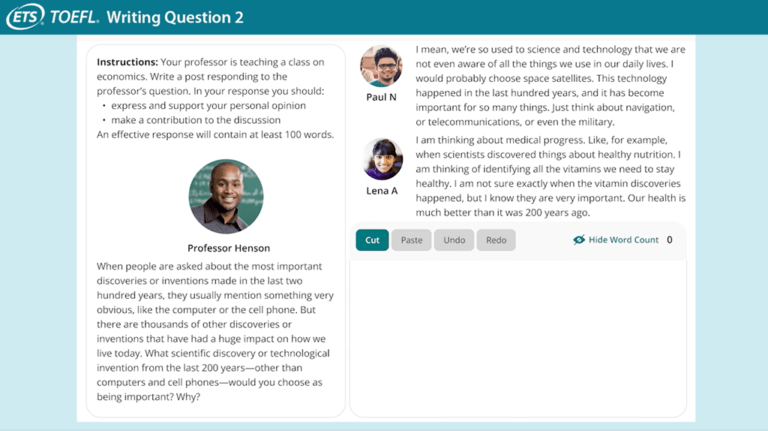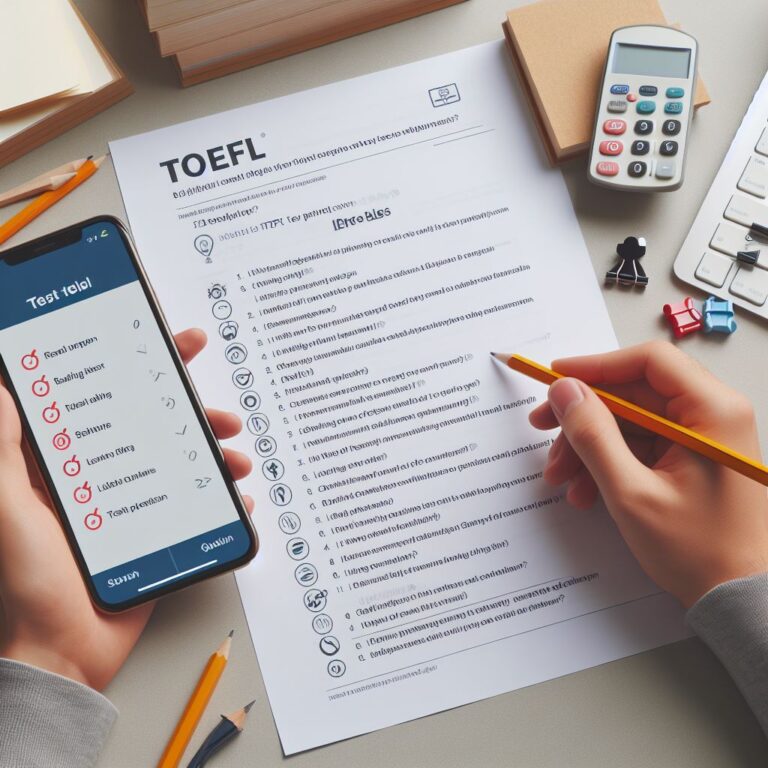TOEFL Writing for Academic Discussion

Key Takeaways
1. The Task: In the TOEFL Writing for Academic Discussion, you express and support an opinion on an academic topic in 10 minutes. You’ll get a prompt, read two students’ opinions, and write your own response with reasons and examples, aiming for at least 100 words.
2. Challenges and Strategies: This task is challenging because you need to understand the topic, build coherent arguments, and write academically within a short time. Key strategies include understanding the prompt, planning your response, writing clearly, and revising for mistakes.
3. Evaluation Criteria: Your response is graded on content clarity, organization, and language use, including grammar and vocabulary. You should clearly present and support your opinion with reasons and examples.
What you will find in this guide:
The Academic Discussion
The Writing for an Academic Discussion task is a crucial part of the TOEFL iBT test, designed to measure your ability to write in English in an academic setting, and to present your ideas in a clear, well-organized way2.
In this comprehensive guide, I will explore the structure of the task, how to approach it, and how your response is scored1. I’ll also provide you with tips for improving your writing skills1. The task presents you with an online academic discussion where a professor has posted a question about a topic, and some classmates have responded with their ideas1. Your job is to contribute to this discussion in a meaningful way1.
The beauty of this task is that it asks you to do something you do every day! It simulates the kind of academic discussions you might participate in during your studies, making it a valuable exercise for prospective students. It’s not just about writing; it’s about engaging in a thoughtful exchange of ideas, expressing your opinion, and contributing to a broader conversation1.
Remember, there’s no maximum length for your response, but a good response is usually at least 100 words1. Your opinion should be clear and cohesive, and it should be developed and well supported by reasons or examples1.
Stay tuned as we delve deeper into the nuances of the TOEFL Writing for Academic Discussion task. I’ll cover strategies to understand the prompt, plan your response, write effectively, and revise for clarity and correctness3. So, whether you’re a seasoned English speaker or just starting your journey, this guide is here to help you succeed in your TOEFL iBT Writing section. But before we get to the guide, let’s see what this questions looks like!

Potential Challenges
First of all, let’s dive into the potential challenges you might face while tackling the TOEFL iBT Writing for Academic Discussion task.
One of the primary challenges is understanding the prompt correctly. The task requires you to respond to a question posted by a professor and the ideas presented by classmates. Misinterpreting the question or the classmates’ responses can lead to an off-topic response, which can significantly impact your score.
Another challenge is time management. Although there’s no maximum length for your response, you’re working against the clock. Balancing the need to write a comprehensive response with the time constraint can be tricky.
The third challenge lies in expressing your opinion clearly and cohesively. You need to develop your opinion and support it with reasons or examples. However, it’s not uncommon for test-takers to struggle with organizing their thoughts and presenting them in a logical, coherent manner.
Lastly, language proficiency can pose a challenge. The TOEFL iBT Writing section tests your ability to write in English in an academic setting. Therefore, a strong grasp of grammar, vocabulary, and sentence structure is essential.
But don’t worry! These challenges are not insurmountable. With the right strategies and plenty of practice, you can overcome these hurdles and ace the TOEFL iBT Writing for Academic Discussion task. Stay tuned as we delve deeper into each of these challenges and provide you with effective strategies to tackle them in the upcoming sections of this guide.
Guide to Writing for Academic Discussion
Here are the steps you need to take to write a good response:
Step 1: – Read the prompt carefully and identify the main topic.
Step 2: – Read what other two opinions discuss and identify their main points. Make sure to agree or disagree with the ideas.
Step 3: – Decide about your own position and/or opinion.
Step 4: – Make an outline of your position and decide how to support your opinion. Make sure to mention other ideas and contribute to the discussion.
Step 5: – Decide what words/structures you would want to use to give your response linguistic variety.
Step 6: – Write your response.
Step 7: – Check your response for spelling and punctuation errors. Make sure you have used clear transitions and connectors to show the relationship between your ideas. check that you have used appropriate vocabulary and grammar to convey your meaning accurately and clearly.
Sample Question
Now, let’s put the steps I presented in the guide into practice and see how we can use my guide to answer a sample TOEFL writing for academic discussion question:
Prompt:
Professor: Today we’re going to discuss the balance between personal privacy and national security. Personal privacy is a fundamental right that allows individuals to live without unwarranted intrusion. On the other hand, national security is crucial for the safety and well-being of the nation and its citizens. If you had to choose between prioritizing personal privacy or national security, which one would you choose and why?
Alex: I would prioritize personal privacy. We live in a digital age where our personal information can be easily accessed and misused. While national security is important, it should not come at the cost of personal privacy. I believe we need to establish strict regulations to protect individual privacy and promote transparency in surveillance activities.
Maggie: While I agree with Alex that personal privacy is important, I think that national security should be our top priority. We live in a world where threats to national security are increasingly complex and unpredictable. A strong security apparatus is essential to protect our nation and its citizens. Moreover, with proper checks and balances, it is possible to ensure national security without significantly infringing on personal privacy.
Sample Answers
Sample Answer 1 (with template):
This is a complex issue, but I believe we should prioritize personal privacy. I agree with Alex’s point about the importance of personal privacy in the digital age. I would add that an invasion of personal privacy can lead to a range of problems, from identity theft to misuse of personal information. Maggie makes a valid point about the importance of national security, but she doesn’t consider that excessive surveillance can lead to a loss of trust in the government. For instance, the revelation of mass surveillance programs has led to widespread public outcry in the past.
Sample Answer 2 (with template):
While I understand the points made by both Alex and Maggie, I think we should primarily focus on national security. This is because our safety and the safety of our loved ones is paramount. We all want to live in a secure environment, free from threats. This is only possible if our national security apparatus is strong and effective. Some people may feel that personal privacy is more important than national security, but I tend to disagree. My main focus is on the safety and security of our nation and its citizens. I believe that with proper oversight and legal safeguards, it is possible to ensure national security without significantly infringing on personal privacy.
Understanding the Rubric
The TOEFL writing rubric for academic discussion primarily focuses on the following aspects:
- Content: The clarity and development of your ideas.
- Organization: The structure of your response, including the use of transitional phrases.
- Language Use: Your command of English, including grammar, vocabulary, and sentence structure.
The task expects you to present an opinion on a given topic, support it with reasons and examples, and communicate your ideas effectively in written English.
If you want to read the rubric to know all the details, you can open or download the rubric from here:
Let's Read Another Question:
To give you an idea of what to expect, here are some examples of TOEFL Academic discussion questions:
Professor: Today, we will delve into the influence of social media on mental health. With the rise of platforms like Facebook, Instagram, and Twitter, our lives have become increasingly intertwined with virtual connections. Here’s the question for our discussion: Do social media platforms have a positive impact on mental well-being? Why or why not?
Rachel: Personally, I believe that social media platforms have a detrimental impact on mental health. The constant exposure to carefully curated highlight reels of others’ lives can lead to feelings of inadequacy and comparison. Moreover, the addictive nature of these platforms often leads to excessive screen time, causing a decline in face-to-face interactions and genuine social connections. To prioritize mental well-being, we need to disconnect from the virtual world and cultivate meaningful relationships offline.
Mike: While I agree that social media can have negative effects, I also believe it can positively impact mental well-being. These platforms provide a sense of belonging and community, allowing individuals to connect with like-minded people and access support networks. Moreover, social media can be a platform for self-expression, empowering introverted individuals to share their thoughts and creativity with a wider audience. However, it’s crucial to strike a balance, practicing mindful and intentional usage to avoid the pitfalls of excessive comparison and digital dependency.
Sample Answer:
You’ll notice that the question mimics a message board on a university website. Two pupils answer to a question the professor poses. You have to respond to the query. Ten minutes are allotted for reading and writing. You ought to compose “at least” 100 words. I suggest writing a little bit longer (around 130 words).
Sample Answer:
I believe the effects of social media on human’s mental health are mostly detrimental. I concur with Rachel that people are using such platforms excessively and that these platforms have reduced our offline interaction. But I don’t think we can create a balance in real-life by limiting social media use. That’s because we are dependent on the good aspects of social media and that we all use them to follow the topic we’re interested in. I believe the beneficial use of social media should be institutionalized through great educational and culturalization programs. This highlights the role of governments and their plans to rescue us from a rabit hole of bad use and negative effects.
TOEFL Writing for Academic Discussion Template:
Take some time to practice using this template and try to follow the structure presented in the templates below until you find our own. This is valuable exercise that can help you refine your writing skills and discover you personal style. Don’t use the exact words provided, but adapt the structure to suit our needs. Remember, you cannot use this template at the exam. This is only to give you structure in which you experiment, and ultimately find our own rhythm and style.
In my personal view, I believe smartphones have had a positive impact on our communication. I agree with [student]’s point that [mention one point made by the student]. Additionally, I would like to highlight the fact that [expand on the point with your own idea]. For example, [provide a relevant example or personal experience].
Personally, I think smartphones have brought about positive changes in how we communicate. I share [student]’s perspective that [mention one point made by the student]. Moreover, it’s important to consider that [expand on the point with your own idea]. For instance, [provide a real-life scenario or personal anecdote].
In my opinion, smartphones have largely improved our communication methods. I agree with [student]’s idea that [mention one point made by the student]. Additionally, it’s worth mentioning that [expand on the point with your own idea]. For instance, [provide a practical example or observation].
From my standpoint, I believe smartphones have had a beneficial impact on our communication practices. I echo [student]’s sentiment that [mention one point made by the student]. Furthermore, it’s important to recognize that [expand on the point with your own idea]. For example, [provide a relatable situation or personal viewpoint].
Personally, I think smartphones have positively transformed the way we communicate. I align with [student]’s opinion that [mention one point made by the student]. Additionally, it’s worth noting that [expand on the point with your own idea]. For instance, [provide a relevant illustration or personal reflection].
Final Words
Remember that practice is key to success and in this way, following a template can greatly help your progress.
You can also watch this video, where a person from ETS explains the Academic Discussion. Some useful tips there too!
But if you need to improve your vocabulary, read this useful guide on how to improve your vocabulary for TOEFL very fast!.







Кракен зеркало сайт работает чётко
Hello! I’m Pamela, originally from the beautiful city of Tallinn, Estonia. By day, I work in the world of technology, where I get to dive into the fascinating world of technology and innovation. My job keeps me on my toes and constantly learning, which I absolutely love.
When I’m not immersed in the digital world, you can find me enjoying the great outdoors. Hiking is my favorite activity and my way of unwinding. There’s something amazingly peaceful about being in nature, surrounded by breathtaking landscapes and fresh air. Whether it’s a brief walk or a extended adventure, I’m always up for an adventure.
I also enjoy interacting with like-minded individuals who share my interests in both tech and hiking. Feel free to reach out if you want to share thoughts on the newest technological advancements, talk about outdoor adventures, or just have a nice chat!
Looking forward to meeting you!
Best,
Pamela
купить напольный вазон для цветов kashpo-napolnoe-spb.ru – купить напольный вазон для цветов .
Your way of describing everything in this piece of writing
is truly pleasant, every one be capable of easily be aware of it,
Thanks a lot.
Remarkable issues here. I am very satisfied to peer your post.
Thank you a lot and I’m looking forward to touch you. Will you kindly drop me a mail?